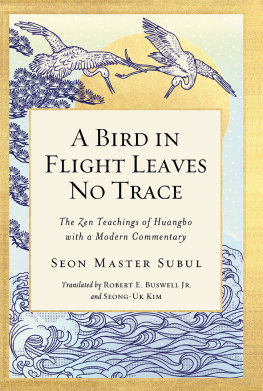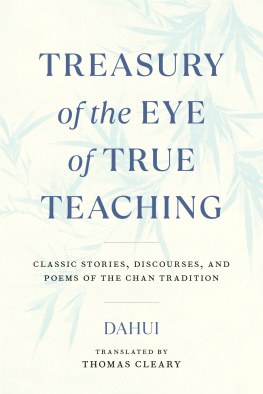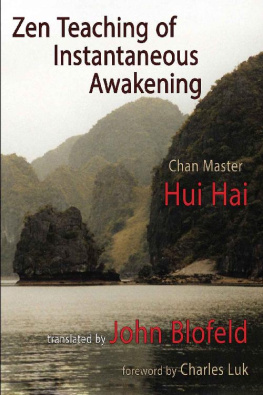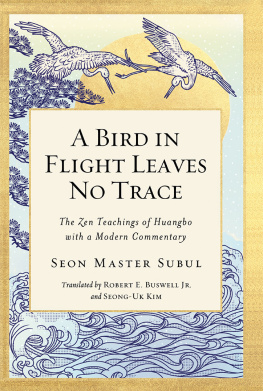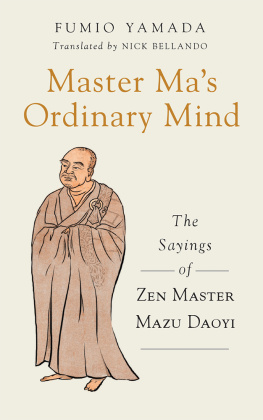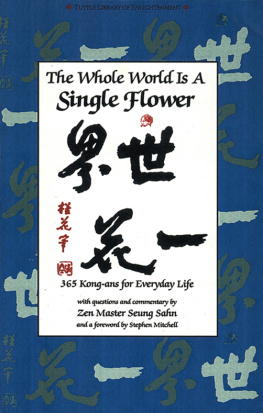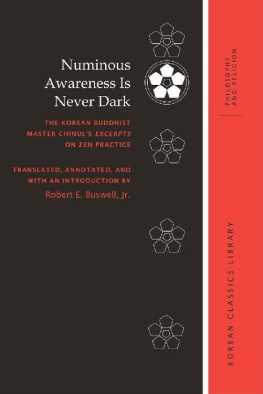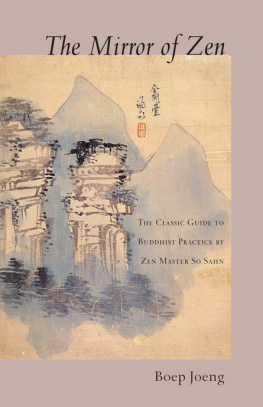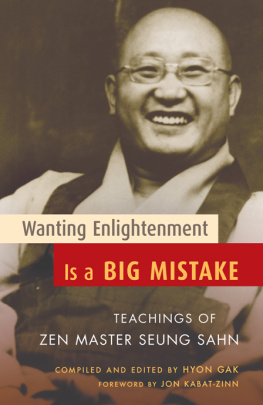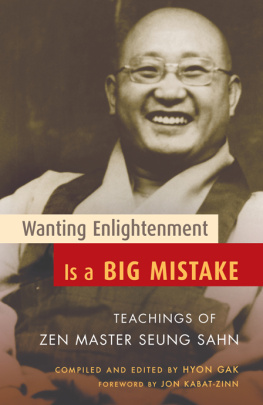SEON MASTER SUBUL SUNIM (b. 1953) is an influential Zen master in Korean Buddhisms Jogye Order, the largest Buddhist order in Korea. He was first ordained in 1975. He founded the organization Anguk Seonwon in Busan in 1989 and opened a branch in Seoul in 1996. Over twenty-five thousand laypeople have taken part in more than three hundred retreats with Master Subul in Korea and around the world. Recently, Subul Sunim has served as the abbot of Beomeosa Monastery and as the Seon master at the International Meditation Center at Dongguk University.
ROBERT E. BUSWELL, JR. (b. 1953) is Distinguished Professor of Chinese and Korean Buddhist Studies at the University of California, Los Angeles, where he holds the Irving and Jean Stone Endowed Chair in Humanities.
SEONG-UK KIM IS the Il Hwan and Soon Ja Cho Assistant Professor of Korean Culture and Religion at Columbia University.
REALIZE THE NATURE OF MIND WITH THIS CONTEMPORARY KOREAN COMMENTARY ON A CLASSIC OF ZEN LITERATURE.
The message of the Tang-dynasty Zen text in this volume seems simple: to gain enlightenment, stop thinking there is something you need to practice. For the Chinese master Huangbo Xiyun (d. 850), the mind is enlightenment itself if we can only let go of our usual way of thinking.
How wonderful to have a clear new translation of the Zen teachings of Huangbo, one of the greatest masters of Zens golden era. Korean Seon Master Subuls commentary is a marvelous addition to the original text, adding refinement to the meaning. Strongly suggested reading for all practitioners.
This meticulous and beautiful translation of a contemporary Korean Zen masters commentary on a Chinese Buddhist classic will benefit countless readers on their journey to spiritual awakening.
Receive the latest news and updates from Wisdom, including new releases and special offers.
Bibliography
P re-modern Sinographic Buddhist sources are quoted from either the Taish Buddhist Canon (Taish) or the ManjiSupplement to the Canon (Xuzangjing) and cited in the following format:
Text Name, Taish or Xuzangjing, sequential number:/volume number./page./register./line; for example,
Jingde chuandeng lu , Taish 2076:51.208c23.
Wudeng huiyuan , Xuzangjing 1565:80.30b15.
Taish shinsh daizky . Tokyo: Issaiky Kankkai, 192435. We have used the SAT digital search functions to search that canon: Sagankkta Taiotripiaka (SAT) Daizky Text Database, produced by Masahiro Shimoda et al., and maintained by the Graduate School of Humanities and Sociology, University of Tokyo. http://21dzk.l.u-tokyo.ac.jp/SAT/. Accessed January 30, 2018.
Manji Shinsan Dainihon Zokuzky . Tokyo: Kokusho Kankkai , 197589. We have used the CBETA online edition for both text and search: CBETA Dianzi Fodian Jicheng . http://tripitaka.cbeta.org. Accessed January 30, 2018.
SECONDARY SOURCES
Baengnyeon Seonseo Ganhaenghoe , trans. Seollim bojeon . In Seollim gogyeong chongseo , vol. 1. Seoul: Janggyeonggak Chulpansa , 1988.
Blofeld, John, trans. The Zen Teaching of Huang Po on the Transmission of Mind. New York: Grove Press, 1958.
Broughton, Jeffrey L.. The Bodhidharma Anthology: The Earliest Records of Zen. Berkeley and Los Angeles: University of California Press, 1999.
. Zongmi on Chan. New York: Columbia University Press, 2009.
Broughton, Jeffrey L., with Elise Yoko Watanabe, trans. The Chan Whip Anthology: A Companion to Zen Practice. New York: Oxford University Press, 2015.
. The Letters of Chan Master Dahui Pujue. New York: Oxford University Press, 2017.
Buswell, Robert E., Jr. Chan Hermeneutics: A Korean View. In Donald S. Lopez, Jr., ed., Buddhist Hermeneutics, 23156. Kuroda Institute Studies in East Asian Buddhism 6. University of Hawaii Press, 1988.
, trans. Chinul: Selected Works. Collected Works of Korean Buddhism 2. Seoul: Jogye Order of Korean Buddhism, 2012.
, trans. Cultivating Original Enlightenment: Wnhyos Exposition of the Vajrasamdhi-Stra (Kmgang sammaegyng Non). The International Association of Wnhyo Studies Collected Works of Wnhyo 1. Honolulu: University of Hawaii Press, 2007.
, trans. Numinous Awareness Is Never Dark: The Korean Master Chinuls Excerpts on Zen Practice. Korean Classics Library: Philosophy and Religion. Honolulu: University of Hawaii Press, 2016.
. The Short-Cut Approach of Kan-hua Meditation: The Evolution of a Practical Subitism in Chinese Chan Buddhism. In Sudden and Gradual Approaches to Enlightenment in Chinese Thought, edited by Peter N. Gregory, 32177. Kuroda Institute Studies in East Asian Buddhism 5. Honolulu: University of Hawaii Press, 1987.
. The Transformation of Doubt (Yqng ) into a Positive Emotion in Chinese Buddhist Meditation. In Love and Emotions in Traditional Chinese Literature, edited by Halvor Eifring, 22536. Leiden: E. J. Brill, 2004.
. The Zen Monastic Experience: Buddhist Practice in Contemporary Korea. Princeton, NJ: Princeton University Press, 1992.
Buswell, Robert E. Jr., and Robert M. Gimello, eds. Paths to Liberation: The Mrga and Its Transformations in Buddhist Thought. Kuroda Institute Studies in East Asian Buddhism 7. Honolulu: University of Hawaii Press, 1992.
Buswell, Robert E. Jr., and Donald S. Lopez, Jr. The Princeton Dictionary of Buddhism. Princeton , NJ: Princeton University Press, 2014.
Cleary, Thomas, and J. C. Cleary, trans. The Blue Cliff Record. Boulder: Praj Press, 1978.
Digital Dictionary of Buddhism. Edited by A. Charles Muller. http://www.buddhism-dict.net/ddb/. Accessed January 30, 2018.
Hakeda, Yoshito S. trans. The Awakening of Faith Attributed to Avaghosha. New York: Columbia University Press, 1967.
Hucker, Charles O. A Dictionary of Official Titles in Imperial China. Stanford, CA: Stanford University Press, 1985.
Iriya Yoshitaka , ed. and trans. Denshin hy Enryroku : . Zen no goroku 8. Tokyo: Chikuma Shob , 1969.
Joo, Ryan Bongseok (Haemin Sunim). Gradual Experiences of Sudden Enlightenment: The Varieties of Ganhwa Seon Teachings in Contemporary Korea. In Ganhwa Seon, Segye-reul bichuda , , Proceedings of the First International Conference on Ganhwa Seon, 2: 21939. Seoul: Dongguk Daehakgyo Bulgyo Haksulwon , 2010. A version of this paper is available on-line at https://terebess.hu/zen/mesterek/Contemporary-Hwadu-Practice.pdf . Accessed January 30, 2018.
Kim, Seong-Uk. Three Places of Mind-Transmission: The Polemical Application of Mind-Transmission Stories in Korean Sn Buddhism. Journal of the American Oriental Society 133.4 (2013): 63550.
. The Zen Theory of Language: Linji Yixuans Teaching of Three Statements, Three Mysteries, and Three Essentials (sanju sanxuan sanyao ). Journal of the International Association of Buddhist Studies 36/37 (2013/2014): 6990.
Kubo, Tsugunari, and Akira Yuyama, trans. The Lotus Sutra. BDK English Tripiaka Series. Berkeley: Numata Center for Buddhist Translation and Research, 2007.

